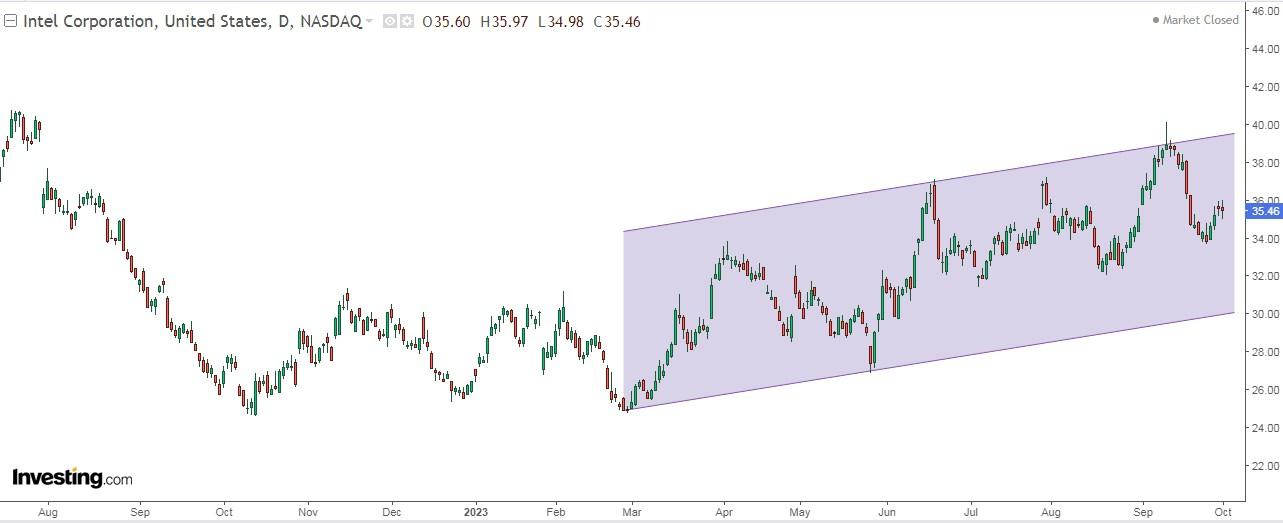- The technology war between the United States and China, with the Netherlands and Japan involved, is set to intensify further.
- We will know which are the 8 companies on S&P 500 that would be hurt the most by having a greater exposure of their earnings in China.
- Intel appears to be one of the companies that could actually benefit from this conflict.
There's no question that we are in the midst of a technological tug-of-war, a battle where the heavyweight contenders are none other than the United States and China. This tussle extends into the realm of cutting-edge microchips, given their paramount strategic significance.
Over time, the United States has carved out a pioneering role in the semiconductor sector. However, it's worth highlighting that nearly 90% of the advanced chips crafted by NVIDIA (NASDAQ:NVDA) and Broadcom (NASDAQ:AVGO) originate from Taiwan, a territory that China lays claim to.
This intricate detail adds layers to the conflict, transcending mere technological rivalry, and from China's perspective, it carries a two-fold interpretation:
- It's a bid to prevent the United States from eroding the technological supremacy of the Asian powerhouse.
- It serves as a blow to China's proclaimed sovereignty.
For now, all eyes are laser-focused on the upcoming elections set for January 13, 2024, in Taiwan. The potential for a peaceful resolution to the standoff between the island nation and mainland China hinges on the outcome of these pivotal elections.
While the U.S. may have believed it had a firm grip on the situation, recent events have shown otherwise. This past summer, China's Huawei unveiled a smartphone flaunting a remarkably advanced chip, underscoring China's persistent threat to the United States.
This development could prompt a ramping up of certain White House measures, including the tightening of export restrictions, inevitably putting downward pressure on sector companies' profits and further stoking the flames of this conflict.
While it's true that U.S. embargoes aim to impede China's production of advanced chips, China has countered by announcing plans to construct four new facilities, effectively tripling its manufacturing capacity.
The overarching U.S. objective is to thwart China's ability to manufacture its integrated circuits in the short and medium term, given their immense importance in the military sector and the realm of artificial intelligence. And let's not forget, chips relying on outdated integration technologies are omnipresent, serving vital roles in automobiles, household appliances, and everyday devices.
Yet, China isn't just facing off against U.S. measures.
The Netherlands has imposed constraints on the sale of critical machinery used in semiconductor manufacturing. This carries significant weight, especially as the Netherlands is home to ASML (NASDAQ:ASML), the world's largest manufacturer of such machinery. Japan has also thrown its hat into the ring, instituting a ban on semiconductor exports in an effort to curb China's technological advancement.
Without a doubt, this conflict will send shockwaves into other sectors.
By the way, Mexico has become a prized gateway for U.S. companies looking to reduce their dependence on China via nearshoring. The latest heavyweight to make a move is Tesla (NASDAQ:TSLA).
Which Stocks Are the Most Exposed to This Conflict?
Against this backdrop, let's assess which S&P 500-listed companies are most likely to feel the heat in this tech war and which could even benefit from it.
Many think that Apple (NASDAQ:AAPL) would be the worst hit, but in reality this is not the case, as its revenues via China account for only 18.8% of the total, a much lower percentage when compared with other tech players, particularly the ones in the semiconductor industry.
Below you can see the list of companies listed on the S&P 500 that have the most exposure to China followed by the percentage of their earnings that come from the Asian giant:
- Qualcomm (NASDAQ:QCOM) 63.5%.
- Monolithic Power (NASDAQ:MPWR) Systems 52%
- Texas Instruments (NASDAQ:TXN) 49%
- NXP Semiconductors (NASDAQ:NXPI)
- Broadcom 35%
- Viatris (NASDAQ:VTRS) 33%
- Albemarle (NYSE:ALB) 33%
- Corning (NYSE:GLW) 30%
Who Could Benefit From It?
On the flip side, Intel Corporation (NASDAQ:INTC) emerges as a company poised to potentially reap benefits from this technology war in the long term as it ramps up its commitment to establish a stronger presence in chip manufacturing facilities within the United States, with ongoing expansions in progress.
INTC will report quarterly results on October 26. In the last 12 months its shares are up by roughly +30% and +5.85% in the last 3 months.
***
Disclosure: The author holds no positions in any of the instruments mentioned in this report.

